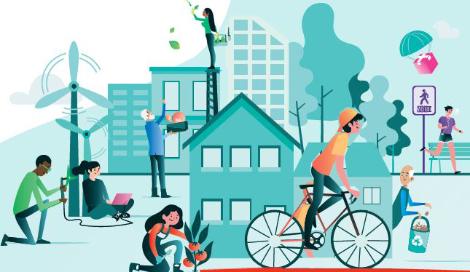Tomorrow my territory 16 Breathing clean air in my territory
Air quality
November 2019
Agence pour l’Environnement et la Maîtrise de l’Energie (ADEME)
The 20 factsheets in the collection « demain MON TERRITOIRE » have been designed to give candidates and elected officials practical keys to take action, to open up the field of possibilities based on the experiences of other elected officials, from small towns to conurbations, large urban areas or sparsely populated areas. In the four corners of France, both in metropolitan France and in the French Overseas Territories, many of them are taking action, together with the players in their territories, to prepare for the future by taking action to mitigate climate change and adapt to its effects. With its knowledge and presence throughout the country, ADEME supports them with its tools, activities and financial aid.

Why is it important to improve air quality?
Air pollution is not only a problem in cities congested by road traffic. Small and medium-sized towns, as well as rural areas, are affected, as the sources are so diverse: transport, industry, agriculture, heating, waste burning, etc. This pollution is classified as a proven carcinogen by the International Agency for Research on Cancer. It causes cardiovascular and respiratory diseases, fertility and child development disorders. Not to mention its multiple consequences on the environment. Indoor air quality is just as worrisome due to sources as diverse as tobacco smoke, construction and decorative materials, furniture, home fragrances, DIY and cleaning products.
How do you do it?
-
Preserving the air is everyone’s business - public authorities, companies, associations, citizens. It is up to the municipalities to create a dynamic, based on the local urban development plan or the territorial climate-air-energy plan.
-
Space is being rearranged to limit the space for the private car and facilitate other modes of travel. Actions are being implemented to encourage walking and cycling (dedicated itineraries, secure bicycle parking, assistance with bicycle purchase, etc.) and the supply of public transport is being expanded.
-
We limit the passage of the most polluting vehicles, with low-emission zones. The use of electric cars is encouraged, thanks to the installation of recharging points, car-sharing offers and privileged parking spaces. Children are protected, with a redesigned traffic flow around schools and nurseries - speeding at 30 km/h, no parking…
-
The region is setting an example by gradually equipping itself with less polluting vehicles (electric, biogas, hydrogen, etc.), equipping schools and nurseries with high-performance ventilation systems and disseminating good practices in these establishments: ventilation, choice of eco-labelled products for paints, cleaning products, etc.
-
The inhabitants are sensitized in their daily life. Best practices for wood heating are communicated. They are reminded that burning green waste in the open air is prohibited and are offered alternatives.
-
Citizens are alerted to indoor air quality issues. By reminding them of the importance of regularly ventilating their homes and reducing sources of pollution: do not smoke, limit the use of indoor fragrances, choose raw wood furniture and use eco-labelled cleaning products.